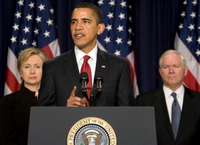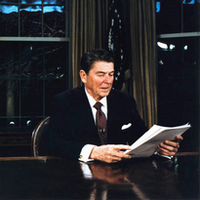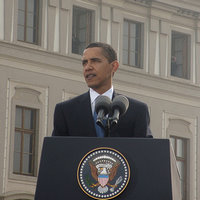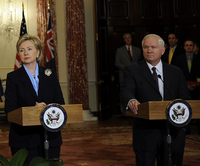On the merits, I agree with Andrew Bacevich that the war in Afghanistan does not answer to America’s vital interests. To begin with, to whatever degree we deny al-Qaida the tranquility of safe havens there — or in the Pakistani FATA — they will find other locales to replace it. To the extent that we destroy al-Qaida as an operational threat, whatever urge it gives expression to will find some other organizational structure to replace it. The best we can do to fight, not terrorism, but these terrorists is to contain them until their movement burns itself out, which — […]
Asia-Pacific Archive
Free Newsletter

Driven by food security concerns, governments around the world have begun purchasing land in developing nations for agricultural purposes. Foreign land acquisition — known by critics as “land grab” — responds to worries over global problems that include growing water scarcity, teeming populations, increasing demand for food and bio-fuels, and climate change impacting arable land and its productivity. This trend necessitates an international framework or code of conduct that can protect small local farmers as well as the economy and the ecology of the host country from potentially negative impacts. Such a code would seek to resolve the question of […]
Bill Clinton’s successful diplomatic mission to North Korea is instructive for a number of reasons. To begin with, the entire episode exemplifies North Korea’s method in general — namely, hostage-taking and blackmail. In this case, the hostages were the two American reporters whose freedom Clinton managed to secure. In the case of North Korea’s nuclear program, the hostages are the entire Korean peninsula and regional stability at large. The case of the reporters is instructive also for what it reveals about North Korea’s objective: respect. Laura Rozen’s behind-the-scenes play-by-play shows the degree to which the mission’s success depended on an […]
Anyone wondering what the Kyrgyz giveback to Russia would be for extending the U.S. lease at Manas didn’t have to wait long. That base is getting costly, especially since the logic for it ends with the operations in Afghanistan, whereas whatever concessions the Russians get in Kyrgyzstan are likely to have a lot more staying power.
Seems like the U.S. isn’t the only one having a bit of difficulty with the “hold” component of “Clear, Hold and Build” in Afghanistan: Taliban fighters are returning to an area in northernAfghanistan just days after being driven off in a combinedAfghan-German military operation. There’s growing concern that theTaliban — and al-Qaida fighters — are forming strongholds in what hadbeen the relatively peaceful north. . . . The reports coming from the Kunduz area raise doubts about thesuccess of Operation Adler. The Afghan Army said it wouldn’t repeat themistake made in past offensives that troops were removed too quickly,enabling the […]
I didn’t see a whole lot new, other than the name of NATO’s secretary general, in this Steven Erlanger interview with Anders Fogh Rasmussen. Afghanistan and Russia are still the alliance’s top priorities, Europe still needs to do more for the former, and the alliance’s rhetoric still doesn’t quite match up to the status quo on the latter. This did catch my eye, though, in response to a question about France’s reintegration of the alliance’s military command: “The French decision has removed a lot of suspicion internally”within NATO, he said. “It opens big and interesting perspectives fortrans-Atlantic relations and the […]

To get a sense of what “complex operations” are, one need look no further than the kind of wars the U.S. fights when it intervenes overseas today. Unlike the total wars of the past, in which the U.S. military battled the national army of an enemy state, today’s struggles for security, stabilization, peace-building, reconstruction, and development in the most fragile states around the world are engaged by several different departments of the U.S. government. That’s it in a nutshell. But clearly, describing it is far easier than doing it. When you listen to how the best minds that are thinking […]

An Alternative to Arms Control Every Washington wonk dreams that a new president will pick up his or her agenda. When it comes to advocates for nuclear arms control, that dream seems to be coming true. On the editorial pages of the Wall Street Journal in January 2007, George Shultz, William Perry, Henry Kissinger and Sam Nunn voiced a clarion call for the “road to zero,” urging other former high-level officials from countries around the world to join them in pushing for the global abolition of nuclear weapons. The following year, only months before the presidential election, George Perkovich and […]

While headlines focus increasingly on President Barack Obama’s responses to the nuclear programs of North Korea, Iran, and Pakistan, the new administration has been quietly investing a substantial amount of diplomatic time and capital in a somewhat obscure meeting that nevertheless could have significant implications for Obama’s nonproliferation agenda. The meeting, which will take place at the United Nations nearly a year from now, is the latest in a regularly scheduled series of gatherings of signatory states to review the nuclear Nonproliferation Treaty. To a significant degree, the Obama administration’s posture to date on a variety of nonproliferation issues has […]

These are nerve-racking times at the Pentagon. For “Big War” adherents, Iraq is not looking like the “one off” that many hoped it would be, as Afghanistan-Pakistan appears to be, if anything, an even harder slog. None of the dominant Big War scenarios are looking good, now that Iran is ever closer to nuclear deterrence, North Korea ever closer to collapse, and Taiwan ever closer to a peace deal with Beijing. Secretary of Defense Robert Gates, meanwhile, is locking in a more balanced take on small wars versus large, and the serious Leviathan budget-cutting has begun. Clearly, a tipping point […]
CANBERRA, Australia — The chance to overhaul Australian defense policies had loomed large on the nation’s political landscape when Prime Minister Kevin Rudd and his left-wing Labor government ended the 13-year rule of John Howard’s conservatives in December 2007. Rudd’s team was going to rewrite the script: Where Howard enjoyed being feared, Rudd had developed a fondness for being liked. From the treatment of refugees, to wars in Afghanistan and Iraq, terrorism in Southeast Asia and relations with China, Rudd was seen as offering a smarter, cleaner approach based on a broad consensus. That — coupled with a new administration […]
